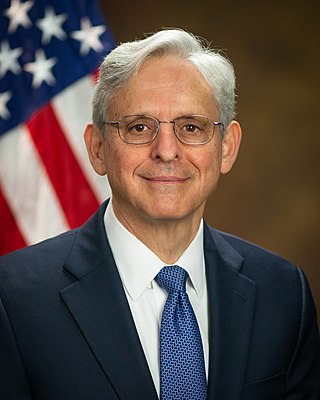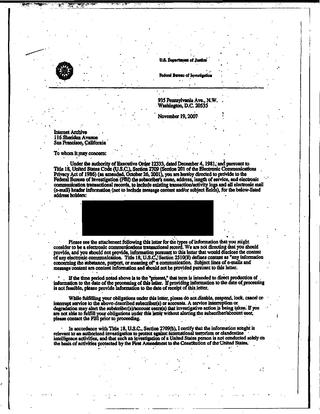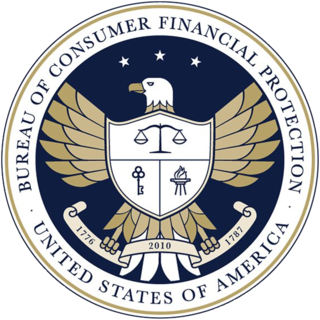
The False Claims Act of 1863 (FCA) is an American federal law that imposes liability on persons and companies who defraud governmental programs. It is the federal government's primary litigation tool in combating fraud against the government. The law includes a qui tam provision that allows people who are not affiliated with the government, called "relators" under the law, to file actions on behalf of the government. This is informally called "whistleblowing", especially when the relator is employed by the organization accused in the suit. Persons filing actions under the Act stand to receive a portion of any recovered damages.

The United States Department of Justice (DOJ), also known as the Justice Department, is a federal executive department of the U.S. government that oversees the domestic enforcement of federal laws and the administration of justice. It is equivalent to the justice or interior ministries of other countries. The department is headed by the U.S. attorney general, who reports directly to the president of the United States and is a member of the president's Cabinet. Merrick Garland has served as attorney general since March 2021 to 2025. The acting attorney general is James McHenry.

The Federal Trade Commission Act of 1914 is a United States federal law which established the Federal Trade Commission. The Act was signed into law by US President Woodrow Wilson in 1914 and outlaws unfair methods of competition and unfair acts or practices that affect commerce.

The Posse Comitatus Act is a United States federal law signed on June 18, 1878, by President Rutherford B. Hayes that limits the powers of the federal government in the use of federal military personnel to enforce domestic policies within the United States. Congress passed the Act as an amendment to an army appropriation bill following the end of Reconstruction and updated it in 1956, 1981 and 2021.

United States attorneys are officials of the U.S. Department of Justice who serve as the chief federal law enforcement officers in each of the 94 U.S. federal judicial districts. Each U.S. attorney serves as the United States' chief federal criminal prosecutor in their judicial district and represents the U.S. federal government in civil litigation in federal and state court within their geographic jurisdiction. U.S. attorneys must be nominated by the president and confirmed by the Senate, after which they serve four-year terms.
A subpoena duces tecum, or subpoena for production of evidence, is a court summons ordering the recipient to appear before the court and produce documents or other tangible evidence for use at a hearing or trial. In some jurisdictions, it can also be issued by legislative bodies such as county boards of supervisors.

Discovery, in the law of common law jurisdictions, is a phase of pretrial procedure in a lawsuit in which each party, through the law of civil procedure, can obtain evidence from other parties. This is by means of methods of discovery such as interrogatories, requests for production of documents, requests for admissions and depositions. Discovery can be obtained from nonparties using subpoenas. When a discovery request is objected to, the requesting party may seek the assistance of the court by filing a motion to compel discovery. Conversely, a party or nonparty resisting discovery can seek the assistance of the court by filing a motion for a protective order.

Merrick Brian Garland is an American lawyer and jurist who served as the 86th United States attorney general from 2021 to 2025. He previously served as a circuit judge of the United States Court of Appeals for the District of Columbia Circuit from 1997 to 2021. In 2016, President Barack Obama nominated Garland to the U.S. Supreme Court, but the U.S. Senate refused to hold a vote to confirm him.

The Foreign Agents Registration Act (FARA) is a United States law that imposes public disclosure obligations on persons representing foreign interests. It requires "foreign agents"—defined as individuals or entities engaged in domestic lobbying or advocacy for foreign governments, organizations, or persons —to register with the Department of Justice (DOJ) and disclose their relationship, activities, and related financial compensation.
Title V: Removing obstacles to investigating terrorism is the fifth of ten titles which comprise the USA PATRIOT Act, an anti-terrorism bill passed in the United States after the September 11, 2001 attacks. It contains 8 sections regarding the capture and prosecution of terrorists.

The following is a section summary of the USA PATRIOT Act, Title II. The USA PATRIOT Act was passed by the United States Congress in 2001 as a response to the September 11, 2001 attacks. Title II: Enhanced Surveillance Procedures gave increased powers of surveillance to various government agencies and bodies. This title has 25 sections, with one of the sections containing a sunset clause which sets an expiration date, of 31 December 2005, for most of the title's provisions. On 22 December 2005, the sunset clause expiration date was extended to 3 February 2006.

A national security letter (NSL) is an administrative subpoena issued by the United States government to gather information for national security purposes. NSLs do not require prior approval from a judge. The Stored Communications Act, Fair Credit Reporting Act, and Right to Financial Privacy Act authorize the United States government to seek such information that is "relevant" to an authorized national security investigation. By law, NSLs can request only non-content information, for example, transactional records and phone numbers dialed, but never the content of telephone calls or e-mails.
On December 7, 2006, the George W. Bush administration's Department of Justice ordered the midterm dismissal of seven United States attorneys. Congressional investigations focused on whether the Department of Justice and the White House were using the U.S. attorney positions for political advantage. The allegations were that some of the attorneys were targeted for dismissal to impede investigations of Republican politicians or that some were targeted for their failure to initiate investigations that would damage Democratic politicians or hamper Democratic-leaning voters. The U.S. attorneys were replaced with interim appointees under provisions in the 2005 USA PATRIOT Act reauthorization.

The President's Surveillance Program (PSP) is a collection of secret intelligence activities authorized by the President of the United States George W. Bush after the September 11 attacks in 2001 as part of the War on Terrorism. Information collected under this program was protected within a Sensitive Compartmented Information security compartment codenamed STELLARWIND.
The Attorney General of Virginia's climate science investigation was a civil investigative demand initiated in April 2010 by Virginia Attorney General Ken Cuccinelli, who rejects the scientific consensus on climate change, for a wide range of records held by the University of Virginia related to five grant applications for research work by a leading climate scientist Michael E. Mann, who was an assistant professor at the university from 1999 to 2005. The demand was issued under the Virginia Fraud Against Taxpayers Act in connection with claims by Cuccinnelli that Mann had possibly violated state fraud laws in relation to five research grants, by allegedly manipulating data. No evidence of wrongdoing was presented to support the claim. Mann's earlier work had been targeted by climate change deniers attacking the hockey stick graph, and allegations against him were renewed in late 2009 in the Climatic Research Unit email controversy but found to be groundless in a series of investigations.
The WikiLeaks-related Twitter court orders were United States Department of Justice 2703(d) orders accompanied by gag orders issued to Twitter in relation to ongoing investigations of WikiLeaks issued on 14 December 2010. The U.S. government sent Twitter a subpoena for information about Julian Assange and several other WikiLeaks-related persons, including Chelsea Manning. Twitter appealed against the accompanying gag order in order to be able to disclose its existence to its users, and was ultimately successful in its appeal.

The Consumer Financial Protection Bureau (CFPB) is an independent agency of the United States government responsible for consumer protection in the financial sector. CFPB's jurisdiction includes banks, credit unions, securities firms, payday lenders, mortgage-servicing operations, foreclosure relief services, debt collectors, for-profit colleges, and other financial companies operating in the United States. Since its founding, the CFPB has used technology tools to monitor how financial entities used social media and algorithms to target consumers.

Leandra English v. Donald Trump, et al., No. 1:17-cv-02534, was a lawsuit before the United States District Court for the District of Columbia. The plaintiff, Leandra English, alleged that the defendants, Donald Trump and Mick Mulvaney, violated 12 U.S.C. § 5491(b)(5)(B), a component of the Dodd–Frank Act of 2010, when President Trump appointed Mulvaney to be Acting Director of the Consumer Financial Protection Bureau (CFPB).
Seila Law LLC v. Consumer Financial Protection Bureau, 591 U.S. 197 (2020) was a U.S. Supreme Court case which determined that the structure of the Consumer Financial Protection Bureau (CFPB), with a single director who could only be removed from office "for cause", violated the separation of powers. Handed down on June 29, 2020, the Court's 5–4 decision created a new test to determine when Congress may limit the power of the president of the United States to remove an officer of the United States from office.
The United States Department of Justice under the Trump administration acquired by a February 2018 subpoena the Apple iCloud metadata of two Democrats on the House Intelligence Committee, several others associated with the committee, and some of their family members. The subpoena covered 73 phone numbers and 36 email addresses since the inception of the accounts. Seizing communications information of members of Congress is extraordinarily rare. The department also subpoenaed and obtained 2017 and 2018 phone log and email metadata from news reporters for CNN, The Washington Post and The New York Times. Apple also received and complied with February 2018 subpoenas for the iCloud accounts of White House counsel Don McGahn and his wife. Microsoft received a subpoena relating to a personal email account of a congressional staff member in 2017.